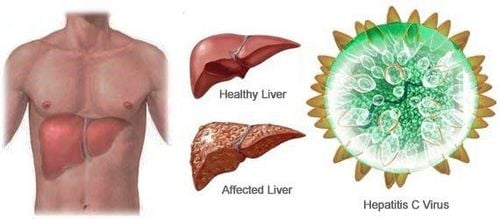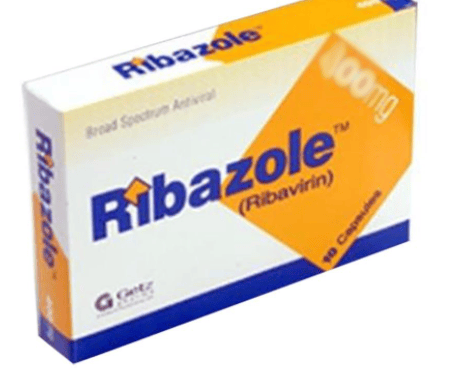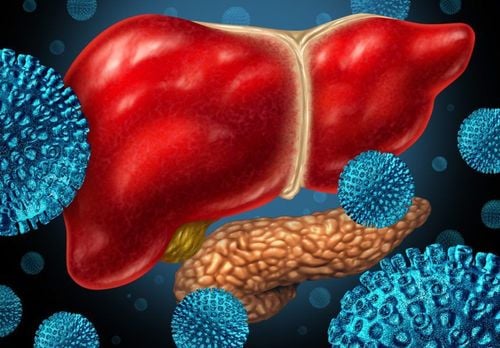This is an automatically translated article.
The article was professionally consulted by Dr. Mang Thi Phuong Mai - Department of Medical Examination & Internal Medicine - Vinmec Nha Trang International General HospitalIn the process of developing and causing disease, the hepatitis C virus attacks and destroys liver cells. If not detected and treated in time, the liver will be damaged and scar tissue will appear, thereby leading to complications such as cirrhosis, liver failure and liver cancer.
1. The ability to cause disease
Hepatitis C is one of the dangerous infectious liver diseases caused by the Hepatitis C virus (HCV). HCV has 6 genotypes: 1, 2, 3, 4, 5, 6. In Vietnam, the common genotypes are 1 and 6. Hepatitis C has a rather long incubation period, from 2 weeks to 6 months, depending on the virus. The condition of each patient, about 80% of infected people have no symptoms.Hepatitis C is divided into 2 stages: acute hepatitis C and chronic hepatitis C.
Acute phase of hepatitis C :
Some patients have fatigue, loss of appetite, jaundice, yellow eyes, dark urine. Diagnosis is based on blood tests. The duration of HCV infection is less than 6 months. Chronic hepatitis C stage :
People infected with hepatitis C virus for many years can damage the liver. In many cases, there are no symptoms until complications develop. In asymptomatic patients, hepatitis C is often detected by blood tests for liver enzymes (ALT, AST), and up to 20 to 30% of chronic hepatitis develops after a period of time. develop cirrhosis, 30% of which can lead to primary liver cancer after 10-20 years. These people may also have other symptoms, including swelling in the legs and abdomen, and a buildup of toxins in the blood that can lead to brain damage. Viral infection with 2 types of hepatitis B and hepatitis C has a much higher risk of leading to cirrhosis and liver cancer than with just one type. However, the mechanism of liver carcinogenesis of the hepatitis C virus is still unknown until now.

Hình ảnh gan bị ảnh hưởng do viêm gan C
2. Consequences if not treated promptly
If hepatitis C is not treated promptly, it will leave serious complications such as:Chronic hepatitis: About 70-80% of hepatitis C virus infections will turn into chronic liver disease if not clear the virus after 6 months. Chronic hepatitis C progresses very silently over 10-30 years, so patients are often not diagnosed and treated in time. Many cases are only discovered when there are serious complications such as cirrhosis of the liver, dilated blood vessels in the digestive tract, which can burst causing massive bleeding and death. Once there is cirrhosis, it is difficult for the liver to recover, even if the hepatitis is in remission. Therefore, specialists recommend patients to receive early treatment to prevent or slow progression to cirrhosis.
Cirrhosis: Hepatitis C virus that damages the liver for many years can cause cirrhosis and scar tissue formation. Scar tissue will take a long time, about 20–30 years for liver damage to lead to cirrhosis. If cirrhosis is not treated properly, the risk of liver failure is very high. When the liver has cirrhosis, it will damage healthy cells, causing scars and forming fibrous tissue. They slow the flow of blood through the liver, causing blood to pool in the veins of the digestive system. In the early stages of cirrhosis, there are usually only vague symptoms such as fatigue, loss of appetite or mild pain in the right abdomen, but sometimes there are no symptoms. A common complication of cirrhosis is portal hypertension, in which there is an increase in pressure in the portal vein, which helps transport blood between the organs of the digestive system and the liver.
Liver failure: When cirrhosis is caused by hepatitis C, if not treated, the disease will progress to more and more serious, because scar tissue caused by the virus continues to grow, making liver function decrease. go, gradually lead to liver failure. This is a very serious complication and antiretroviral treatment is extremely necessary and important to eliminate the virus to prevent complications. Liver failure is manifested by very serious signs such as: jaundice, Yellow eyes, decreased urination, swollen limbs, ascites, personality changes.
Liver Cancer: Chronic hepatitis C is one of the causes of liver cancer. This is the late and most dangerous complication of hepatobiliary diseases. When infected with the hepatitis C virus, the risk of liver cancer is 12 times higher than that of people who are not infected and in fact liver cancer often occurs in people with cirrhosis. Hepatitis C virus in addition to attacking and destroying the liver, the complications of the disease also affect other organs and systems in the body. Because while infected with hepatitis C virus, the body forms antibodies to fight, it is this antibody that creates reactions that cause harmful effects to other organs of the body such as: kidney damage, numbness. , itching and pain caused by nerve damage, joint pain, skin redness, ulcers. In addition, hepatitis C can also increase the risk of developing other diseases including diabetes, depression...

Viêm gan C mãn tính là một trong những nguyên nhân gây ung thư gan
3. How to limit complications of Hepatitis C?
Because there is no vaccine to prevent hepatitis C, prevention of transmission routes still plays an extremely important role. The routes of hepatitis C infection include blood transfusion, sexual contact, and mother-to-child transmission.
We need to protect ourselves as well as protect those around us from the risk of infection.
When unfortunately infected with hepatitis C, the patient should not be too worried but should go to the hospital or specialized medical centers for timely examination, advice and treatment. Patients need to strictly follow the treatment regimen of the doctor and should not give up.
Because hepatitis C is silent, it doesn't cause any specific symptoms, so it's best to have annual health check-ups to detect the disease early to have the opportunity to cure the disease. the higher.
Please dial HOTLINE for more information or register for an appointment HERE. Download MyVinmec app to make appointments faster and to manage your bookings easily.













